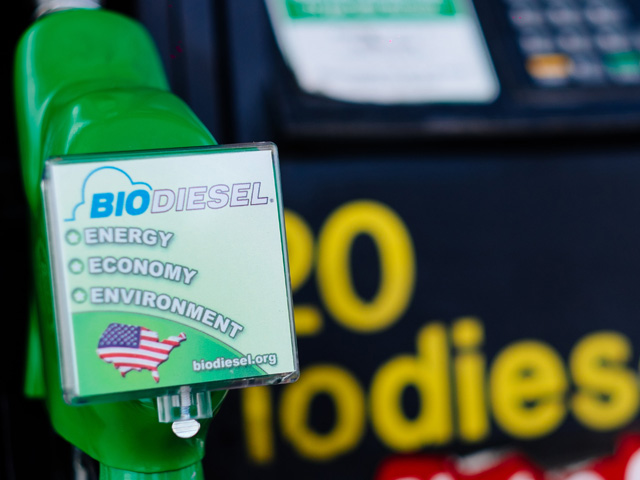Irwin: 2021 Devastating for Biodiesel
Biodiesel Industry Bleeds Red in 2021 While Renewable Diesel Production Explodes
LINCOLN, Neb. (DTN) -- Biodiesel producers using soybean oil as a feedstock had what one agriculture economist called a "devastating year" in 2021, as the unprecedented high cost of soybean oil far outweighed all-time-high biodiesel prices of $6.42 a gallon.
In a new profitability analysis of the industry released on Wednesday, Scott Irwin, Laurence J. Norton chair of agricultural marketing at the University of Illinois, said biodiesel producers using soybean oil spent most of 2021 in the red as growth in the renewable diesel industry exploded.
"The total loss of the representative biodiesel plant in 2021 was a staggering minus $18.3 million, or a return to equity of minus 77.5%," Irwin said in the analysis.
"Not only was this the third consecutive year of negative annual profits, but the 2021 loss equaled 40% of all of the profits earned by the representative plant in previous years. With the addition of 2021 losses, the total cumulative (pre-tax) return to equity holders for the 2007-2021 period stands at only $12.2 million, $11.4 million less than the assumed original equity investment for the plant of $23.6 million."
Irwin said this means the entire U.S. biodiesel industry recorded a "rough estimate" loss of about $987 million in 2021, based on a 61-cent-per-gallon loss.
"There is no doubt that the devastating losses in 2021 severely damaged the attractiveness of biodiesel plants as an investment," Irwin wrote.
The biomass-based diesel industry is undergoing a fundamental shift in the nature of its production, with the emergence of renewable diesel production.
Soybean oil accounted for about 63% of feedstocks used to produce biodiesel in the U.S. as of December 2020, according to the Energy Information Administration.
Despite soy-based biodiesel's struggles, overall biomass-based diesel production grew to a record 3.2 billion gallons in 2021, according to Clean Fuels Alliance America.
RENEWABLE DIESEL SURGES
Irwin said in his analysis that renewable-diesel production grew by 37% from November 2020 to October 2021, while biodiesel production fell by about 6%.
P[L1] D[0x0] M[300x250] OOP[F] ADUNIT[] T[]
"There is no doubt that renewable diesel is rapidly gaining market share from biodiesel," he wrote. "In simplest terms, renewable diesel producers are outbidding biodiesel producers for the feedstock inputs."
Irwin's analysis uses a biodiesel profitability model developed by Don Hofstrand, an Extension field specialist at Iowa State University.
Despite historically bad margins in 2021, Irwin said it is a mystery why more biodiesel plants have not closed.
"One possibility is that biodiesel producers had a source of revenue we did not account for in the analysis, such as COVID relief funds," he said.
"The other possibility is that the industry grimly hung on through 2021 in the face of the onslaught from renewable diesel production, and it is only a matter of time before more biodiesel plants are forced to shut down."
Biodiesel margins began to fall at the end of 2020, and losses were within a historical range for losses at the start of 2021.
"The bottom literally fell out starting in April as soybean oil prices raced far ahead of biodiesel prices," Irwin wrote.
"In August, losses reached the unheard level of minus $1.39 per gallon, which was obviously a new record low for this data set. Losses did lessen substantially during the fall but tailed off once again towards the end of the year. The average net loss estimated for the entire calendar year in 2021 was minus $0.61 per gallon, which dwarfs the historical average profit of $0.03."
Irwin said the biodiesel industry has seen "extended periods" of economic conditions since 2007 that were favorable for shutdown.
Starting in October 2020, however, he said, the length of the "shutdown period" was "simply unprecedented." Irwin said that with the exception of four weeks, the representative plant in his analysis would have operated with biodiesel prices below the shutdown level for nearly 15 consecutive months.
"In the past, increases in soybean oil prices have generally led to increases in biodiesel prices that at least allow producers to break even," Irwin wrote.
"Since mid-2020, all signs point to a policy-driven boom in renewable diesel production as the underlying culprit behind the surging soybean oil prices, and hence, the losses for biodiesel producers."
INVESTMENT LESS ATTRACTIVE
Irwin said the losses sustained in 2021 have made biodiesel plants a less-attractive investment.
"The average return was 3.5% over 2007-2021, and the standard deviation, a measure of risk, was 33.5%," he wrote.
"By comparison, the average return for the stock market over this period, as measured by the S&P 500, was 12.1%, and the associated standard deviation was 17.5%. The ratio of average return to standard deviation provides one measuring stick of an investment's return-risk attractiveness, and on this measure, the ratio for biodiesel investment, 0.10, is substantially lower than the stock market as a whole, 0.69.
Read the full analysis here: https://farmdocdaily.illinois.edu/….
Todd Neeley can be reached at todd.neeley@dtn.com
Follow him on Twitter @DTNeeley
(c) Copyright 2022 DTN, LLC. All rights reserved.




